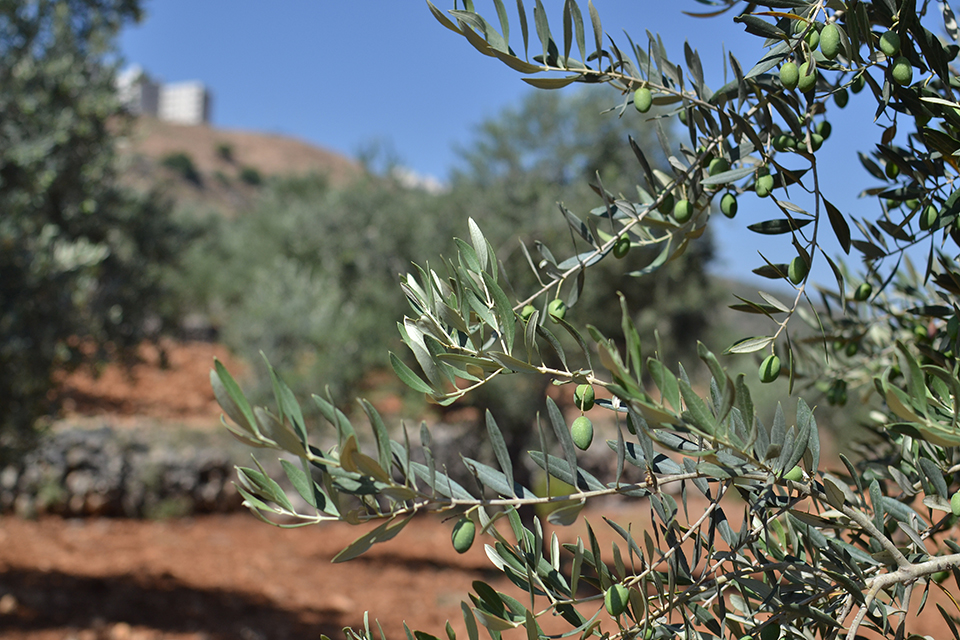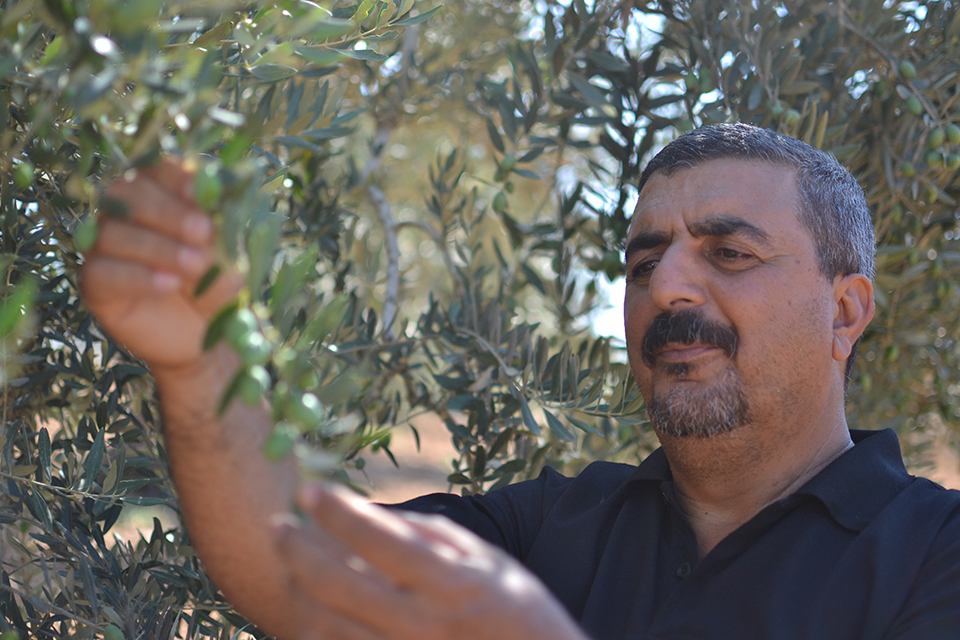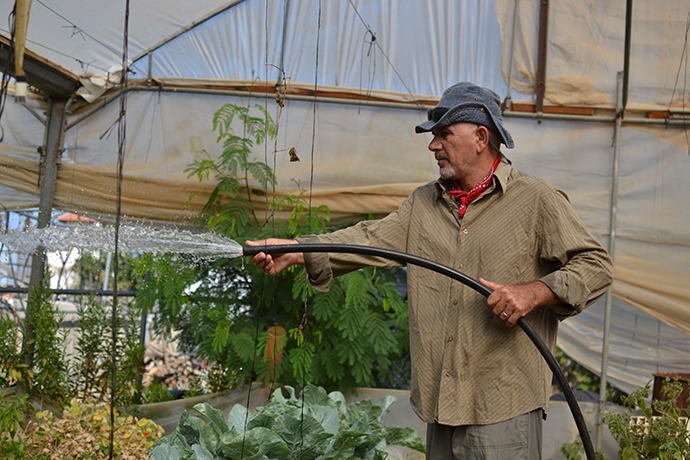
All photographs by Elizabeth Whitman
Falah Ibdah stood on a hillside overlooking Marda, a village in the West Bank. The July sun beat into the furrowed, clumped red soil studded with fists of gray dolomite rock. Every few meters, an olive tree twisted upward from a bulky, gnarled trunk. Atop the ridge to the south rose the Israeli settlement of Ariel, its multi-story, white cement buildings and houses with sloped, red-tiled roofs stark against the blue sky. To the northeast, a quarry was slowly being etched into the earth.
He stepped forward and bent over his ample stomach to snap a stray shoot off the base of a tree. In the summer, Ibdah visited his olive groves weekly, to prune the trees. He cared for five orchards throughout Marda, all of them a few minutes’ drive from his home. Come October, he would be outside every day for the harvest; it was too soon to tell what this season would bring. But if past years were any indication, things did not look good. Recent winters had been too warm, and spring seasons unusually dry. Last year, his harvest netted only half as much oil as the year before.
After two decades of farming, Ibdah had accumulated an almanac’s worth of observations about olives and the best ways to grow them. He understood how to plow the land to create jagged ridges of earth, almost like a saw’s blade, to catch water, and he knew how to test the olives’ ripeness, by how easily they separate from their branches. Now in his early fifties, he has found wisdom and beauty in the trees’ stately existence. As generations of Palestinians before Ibdah have learned, the trees are hardy, and they give back what you put into them. If you neglect a tree, it will weaken, but it will not die. If you care for it, it will flourish and bear fruit. Ibdah’s favorite trees are the oldest ones, whose trunks have expanded a meter or more in diameter, ancient and resilient.
Stepping into the shade of one of his trees, Ibdah recounted an Arabic proverb that alludes to spring thunderstorms: Adhaar abu zilazil wa al-amtaar. March is the father of shaking and rain. But lately, this adage doesn’t seem to apply. In the past decade, less rain has fallen each winter, and in the past two years, the month of March had seen no rain at all, he said. It wasn’t possible to verify his claim—precipitation data in the West Bank is imprecise and not localized. But according to data from the Global Climate Monitor, the area surrounding Marda received approximately thirty-five millimeters of rain in March 2016, approximately fifteen millimeters in March 2017, and less than half that last year. In the century prior, the region’s average monthly rainfall for March was close to seventy millimeters, per data reported by the World Bank.
Some years, Ibdah makes enough to cover his expenses, including compost, hen and cow manure, and Optic, a liquid fertilizer that Ibdah says costs twenty shekels (about five dollars and fifty cents) per liter. Other years, he does not and has had to borrow money from relatives. At harvest, his entire family—his wife and five children—pitch in.
“I worry about the future,” Ibdah said. “If the drought stops, we can deal, but if it worsens, it’ll cause big losses for farms.”
And yet, globally, the olive oil industry is booming. Demand is rising steadily—consumption in the United States has more than tripled since 1990—and prices, while volatile at times, have grown accordingly. After two decades of relatively steady growth, olive oil production dipped in 2012 and again in 2014. Each time, prices surged in response. This demand is driven, in part, by research documenting the health benefits of olive oil, along with a growing market for organic beauty products. Luxury brands such as Lush, the global cosmetics company, use small farms like Ibdah’s to demonstrate their commitment to authentic, ancient modes of production. Nevertheless, these farmers struggle to make a living.
The forces of supply and demand that drive the price of olive oil seem to stop dead at the four-hundred-mile Separation Wall, which closes off the Israeli-occupied territory. Three-quarters of Palestinian olive oil is consumed within the territories. Twenty-two percent is exported to other countries in the Middle East, and 3 percent is exported outside the region. In a good year, olives and olive oil, which are economically and culturally essential for Palestine, account for nearly 20 percent of agricultural production, which constitutes about a quarter of the Palestinian economy.
Some see great potential in Palestinian olive oil. A 2010 Oxfam report declared that it could become a global leader in the organic and fair-trade markets, if Israeli authorities relaxed restrictions on Palestinian territories. Checkpoints and roadblocks hindered farmers’ access to markets, and human rights groups have documented Israeli settlers uprooting and destroying Palestinians’ olive trees. Under the 1995 Oslo II Accord, about 16 percent of Marda is considered Area B, where the Palestinian Authority controls civil life and Israel controls security. The rest falls under Area C, where Israel controls both. Water is another problem, because if Palestinians want to connect to the Israeli-controlled water network, they need a permit, and those are rarely granted. Even if he had the money to pay for an irrigation system to water his olive trees, Ibdah doubts the Israelis would grant him permission to use one. A recent case study by the World Bank flatly described Palestinian olive oil as “not competitive in mainstream international markets,” and the industry as “fragmented and disorganized.”
“I work to keep alive, not to be rich,” Ibdah said. He blames not just the Israelis but the Palestinian Authority. If he sold a kilo of olive oil fresh from the press to traders for twenty to twenty-five shekels, they would turn around and sell it outside the country for two to three times as much, he claimed. “There’s no justice, because the government doesn’t watch over these things,” Ibdah said. “They don’t care about agriculture and farmers.” There was a union, but its members didn’t carry out the demonstrations and protests, such as dumping olive oil in the street, that Ibdah wanted them to. To him, the Palestinian Authority seems to care more about keeping prices low than ensuring that local olive farmers make a decent living.

Falah Ibdah
Ibdah never intended to become an olive farmer. He was born in Marda, a village of roughly twenty-four hundred people in the West Bank, about forty miles north of Jerusalem. When Ibdah was growing up, Marda had no running water. His mother would go to the local spring with a jug and return with it perched carefully on her head. In 1978, Israeli settlers seized the hilltop to the south and built Ariel. A few years later, Ibdah went to Jerusalem to study computer programming, where he learned programming languages BASIC and FORTRAN. He worked illegally in construction in Israel—“forty-eight,” he calls it, referring to the land that Israel won in 1948—until 2000.
In September of that year, the Second Intifada began, Israel cracked down on the border, and slipping from the West Bank into Israel grew more dangerous, then impossible. He was caught on several occasions, and unable to find other work, Ibdah returned to his roots. A few olive orchards still remained in the family, and he started tilling the land, pruning the trees, harvesting their olives, and selling the oil. He learned these traditions from his uncle and from reading books and taking training courses. When he started, a kilo of oil fetched ten shekels ($2.66). Now, a kilo is twenty-five shekels ($6.65), and Ibdah owns two groves and leases three in exchange for two-thirds of the harvest. His eight hundred trees produce green Nablus and black Syrian olives.
Ibdah stood and pulled a green olive, not yet ripe, close to his eyes. Its flesh was hard, its skin flecked with white. He would not be able to determine its value until August, he explained, after pockets of oil had begun to form within the fruit. Each olive’s potential—how much oil it could produce, its flavor, its acidity, its grade—depended on several factors, most importantly temperature and rainfall.
In the last decade, less and less rain had fallen, Ibdah noted. Climate science offers some clarity on this but raises other questions, too. The Middle East is one region that is uniquely sensitive to climate change. As humans continue to release greenhouse gases into the atmosphere, the pattern of hot, rainless summers and cool, wet winters could change. “There is a drying trend around the Mediterranean,” said Yael Kiro, an Israeli geochemist at Columbia University’s Lamont-Doherty Earth Observatory. “There are more intense rainfalls that are more scarce.”
What this will mean for farmers in the region is impossible to predict. Every crop is different—its variety, its location, the pests that are attracted to it. Some might actually fare better in a warmer world. When a group of scientists used climate models to forecast how an increase in global temperatures by 1.8 degrees Celsius would affect olive production around the Mediterranean, they found both “winners and losers.”
Ibdah’s groves are among the losers. The scientists projected that in the Middle East, yields that reached 3.4 tons of olives per hectare in the 1960s would drop to 3.08 tons per hectare in the 2040s. Their findings, published in the Proceedings of the National Academy of Sciences, suggest that warming temperatures would make it harder for the olive fly, a destructive pest, to thrive in the Middle East, but also that warmer temperatures would decrease fruit production.
Excessively warm winters can condemn an olive harvest. Like all fruit-bearing trees, olive trees must hibernate. Botanists call this a chill requirement, where temperatures must remain roughly between thirty-two and forty-five degrees Fahrenheit. The number of hours depends on the fruit, but Ibdah and other farmers in Marda say their olive trees need five hundred hours in hibernation. The cold allows them to produce sprigs of minuscule buds, a small percentage of which then mature into fruit. Too much warmth, Ibdah said, is like coffee: “If you drink coffee, you will not sleep in the night.”
In the spring, the pollen inside the flower fertilizes the embryo, which starts to form a tiny olive, whose pit and fruit grow throughout the season. This process requires steady temperatures, without heat spikes or sudden freezes, Louise Ferguson, a pomologist at the University of California at Davis and an expert on olives and pistachios, told me. A warm spell makes flowers less resistant to a subsequent freeze, and a freeze could damage the flowers.
“The flowers will be less well formed and less likely to produce an embryo that can be successfully fertilized,” Ferguson said. But after that, “olives can tolerate real heat in the summer, which is why they’re good in Mediterranean climates.”
Around late July, the olives begin converting their starches and sugars into oil, and at any point after that, farmers can start to harvest the fruit to press for oil. “The earlier oils are the kind of peppery ones that make you cough,” Ferguson said. The later olives “will have a higher oil content, but it’ll be a milder oil.”
Ibdah starts his harvest relatively late for the region, in October. He and his wife, his five children, and two seasonal workers comb the boughs with plastic hand rakes, scattering olives onto sheets of plastic they spread below the trees. They bring the fruit five kilometers away to an olive press in the town of Zeita—zeit means “oil” in Arabic—and Ibdah watches as it wrings oil from the olives.
If, at any point, there is a heat wave, or if the trees lack sufficient water, the olives shrivel, which means they’ll produce less oil. Trees can rehydrate, to an extent, as those raised without irrigation tend to grow very deep roots. “They are generally able to mine deep groundwater late in the season,” Ferguson said.
On his way to another grove, Ibdah’s unregistered Hyundai sedan strained at a bump in the dirt road. He pressed harder on the gas, until the car gathered enough torque to hoist itself over and continue creeping up the hill. Terraces of trees were built into the hillside, the earth of each layer retained by walls of dark, porous rock to help trap the rain.
Ibdah recalled an experiment he’d joined in a few years before, in nearby Nablus, organized by the Near East Foundation. At a research center, they irrigated olive trees from mid-July to mid-September, and production doubled. Unirrigated, a tree might normally give him six kilograms of olive oil. With irrigation, that amount surged to fourteen or even sixteen, he said.

Murad al-Khuffash
One evening, Ibdah sat in the garden outside his one-story home with Murad al-Khuffash, a fellow farmer who had helped expand his market beyond the West Bank. In 2013, Lush started buying olive oil from Khuffash. At first, the company bought one hundred kilograms a year for research and development. Two years later, it started selling its Olive Tree Gourmet soap in London and, in 2017, the soap became available globally. A 3.5-ounce bar costs $15.95.
In the past two years, Lush has bought more than 15 tons of oil from Khuffash, the company said—numbers that Khuffash corroborated. He is hopeful that the company will order more in the coming year, since this winter has proved cooler and rainier than past seasons.
Worried about the effects of climate change on its raw materials, Lush is trying to spread out its risk, a spokesperson explained. To do so, the company says it can’t depend on single producers or regions for ingredients. In turn, this cuts into its professed aim of supporting small farmers, especially in regions with conflict—people like Ibdah, in the West Bank.
As the sun set, Ibdah and Khuffash traded stories of farming troubles, including the time when wild pigs trampled and ate Khuffash’s cucumbers, or when the settlers of Ariel dumped sewage down the hill onto Marda. They wondered whether the simplicity of their work—a matter they had little choice in—could be leveraged into an advantage.
“We have manual harvesting, plowing, no chemicals, pesticides,” Ibdah pointed out, a claim that is true throughout much of the West Bank. Although Palestinian farmers use these methods typically out of necessity, and not by choice, customers will pay more for organic, nonindustrial olive oil. “We need to have an organic label to sell our product in Europe,” he said, but obtaining that certification requires a complex process of inspections and testing. The West Bank doesn’t have big farms but rather a big group of small farmers, Ibdah said, and if they band together, perhaps they could find a way to compete in the global market.
Around him stood leafy fig, guava, loquat, and lemon trees. Stalks of black-eyed peas climbed up a trellis, dripping with thin, foot-long pods. The voice of Umm Kulthum, the classical Arabic singer, drifted from a speaker sitting on a wooden board wedged high in the branches of the loquat tree. Leaning against the far wall of the garden were dozens of olive saplings, their roots wrapped in black plastic, awaiting planting. The wind picked up, and the sun melted into sherbet, a red glow slipping behind a softly ridged horizon.
Reporting for this piece was funded by the Council for the Advancement of Science Writing, The Brinson Foundation, and the Overseas Press Club Foundation.


